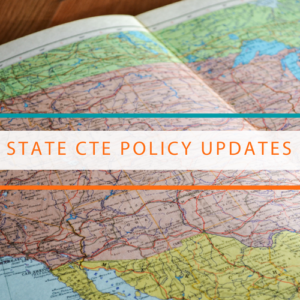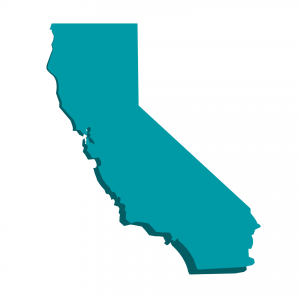While policies grouped under “Funding” and “Industry Partnerships/Work-based Learning” categories have consistently remained in the top five key policy trends for the past ten years, the “Access and Equity” grouping has steadily moved up the ladder, ranking from 10th place in 2017 to 3rd place in 2022. In this blog, we will review four policies enacted in 2023 that are founded in improving access to high-quality Career Technical Education (CTE) programs.
 As explained in Without Limits: A Shared Vision for the Future of Career and Technical Education (CTE Without Limits), CTE plays a vital role in creating an inclusive and equitable future, providing learners with the education and training necessary for success in financially secure and self-sufficient careers while meeting industry talent demands. Advance CTE is committed to supporting states as they tackle the various barriers–program costs, transportation, and eligibility among others–that continue to exacerbate the access and equity challenges special populations face when accessing CTE programs.
As explained in Without Limits: A Shared Vision for the Future of Career and Technical Education (CTE Without Limits), CTE plays a vital role in creating an inclusive and equitable future, providing learners with the education and training necessary for success in financially secure and self-sufficient careers while meeting industry talent demands. Advance CTE is committed to supporting states as they tackle the various barriers–program costs, transportation, and eligibility among others–that continue to exacerbate the access and equity challenges special populations face when accessing CTE programs.
In 2023, CTE leaders adopted innovative strategies to expand access to CTE in their state. Examples of such strategies can be found in the following policies enacted by California, New Hampshire, and Virginia:
California

In October 2023, California enacted A.B. 368 which expands eligibility for learners who are “underrepresented in higher education” in the state’s College and Career Access Pathways (CCAP) dual enrollment partnership grant opportunity. The CCAP Grant awards $100,000 to local education agencies who are interested in establishing or expanding a partnership with a community college to enable learners at participating high schools to access dual enrollment opportunities. A.B 368 expands access to now include first-time college learners, learners experiencing low-income, learners who are current or former foster youth, learners experiencing homelessness or learners at risk of being homeless, learners with disabilities, learners with dependent children, and undocumented learners. By expanding which populations are considered underrepresented, this policy better aligns with learners identified as special populations in the Carl D. Perkins Career and Technical Education Act (Perkins V).
In the same month, California also enacted A.B. 91 which exempts qualifying learners from paying the nonresident tuition rate. Learners who qualify for this exemption are nonresident learners who: experience low income, reside in Mexico, are registered in lower division courses at a qualifying California college, and reside within 45 miles of the California-Mexico border. This policy aims to decrease the financial burden that may hinder nonresident learners from participating in California’s CTE programs by reducing the cost of participation in CTE.
New Hampshire
 In October 2023, New Hampshire passed H.B. 364 which authorized the Department of Education to reimburse the full cost of transportation to learners classified as “at-risk learners” who attend alternative education programs at a regional career and technical education center. This policy aims to mitigate the transportation barrier that may prevent learners from participating in New Hampshire’s CTE programs by covering the cost of transportation to CTE centers.
In October 2023, New Hampshire passed H.B. 364 which authorized the Department of Education to reimburse the full cost of transportation to learners classified as “at-risk learners” who attend alternative education programs at a regional career and technical education center. This policy aims to mitigate the transportation barrier that may prevent learners from participating in New Hampshire’s CTE programs by covering the cost of transportation to CTE centers.
Virginia
 In March 2023, Virginia enacted S.B. 1430 which required the Department of Education to convene a “stakeholder workgroup” to offer recommendations on improving access to paid work-based learning experiences for English Learners. The workgroup was directed to submit their recommendations to the Governor and the Chairman of the House Committee on Education and the Senate Committee on Education and Health by November 1, 2023. No information is available yet on the outcome of the working group, but their recommendations are expected to be published in early 2024. This policy aims to analyze barriers that hinder English Learners from participating in CTE by creating a workgroup tasked with providing strategies to mitigate these barriers.
In March 2023, Virginia enacted S.B. 1430 which required the Department of Education to convene a “stakeholder workgroup” to offer recommendations on improving access to paid work-based learning experiences for English Learners. The workgroup was directed to submit their recommendations to the Governor and the Chairman of the House Committee on Education and the Senate Committee on Education and Health by November 1, 2023. No information is available yet on the outcome of the working group, but their recommendations are expected to be published in early 2024. This policy aims to analyze barriers that hinder English Learners from participating in CTE by creating a workgroup tasked with providing strategies to mitigate these barriers.
For more strategies to expand access to CTE for special populations, check out the “Maximizing Access & Success for Special Population” briefs prepared by Advance CTE and ACTE for:
- Foster Youth
- Non-traditional Learners
- Out-of-Workforce Individuals
Coming in February 2024: Advance CTE and ACTE’s eleventh annual State Policies Impacting CTE: 2023 Year in Review and Advance CTE’s 2023 State Policy Tracker, which will examine CTE and career readiness policies across the nation. While the report focuses on policy trends, the tracker comprises every CTE-related policy enacted within each state.
View the 2022 state policy tracker here.

